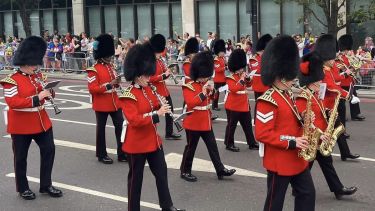My Career – Music and The British Army

Why did you study music at the University of ∫˘¬´”∞“µ?
"∫˘¬´”∞“µ Music Department gives you a well-rounded education and you can really make your degree your own with the wide range of module options. ∫˘¬´”∞“µ is also a wonderful student city, with a brilliant Student‚Äôs Union."
What career opportunities have you had following your course?
"I have since joined the British Army where I am employed as a Flautist in the Band of the Grenadier Guards. Being based in London, I have had the opportunity to take part in the Queens Platinum Jubilee celebrations including the Queen’s Birthday Parade and the Household Division Bands Annual Beating Retreat: Military Music Spectacular. Throughout the year I have also performed in the Queen’s Baton Relay for the Commonwealth Games, taken part in the London Pride Celebrations, performed at The Royal Hospital Chelsea Founders Day Parade supporting the Chelsea Pensioners, travelled around the country on a concert tour and I have played in the gardens of Buckingham Palace supporting those who achieved their Gold Duke of Edinburgh Awards.
There are also numerous opportunities away from music such as sports and adventurous training, I have gained a qualification in Sailing and taken part in Hill Walking in the Lake district and aim to join the Corps Swim Team.
With the Army’s bursary scheme, I will also be able to gain a master’s degree. The organisation is very keen on personal development and will help pay for further qualifications."
What advice would you give someone graduating from music now?
"I first found out about British Army Music through the weekly department bulletin and having never heard of the Royal Corps of Army Music before, signed up for their Summer Academy which sparked my interest in the career. So, my advice for new graduates is look for opportunities anywhere and everywhere, they may stem from something unexpected. Play to your strengths, keep open minded and never forget why you’re perusing a career in music."
What does a typical day look like for you?
"No two days are the same in this job. From being musical support in the Changing of the Guard Ceremony to a Guard of Honour Parade for foreign dignities, politicians, or military leaders. Some days are spent in the rehearsal rooms where we prepare music for all upcoming events, followed by band fitness sessions and sports. When preparing for a big event such as trooping the colour and Beating Retreat, the massed bands of the household division spend hours on the Drill Square rehearsing both music and drill. We also can travel around the country supporting new recruits on their Pass off Parades as well as the Metropolitan Police as they complete their training. High profile gigs aren’t uncommon, such as playing at the FA Cup Final, the British Grand Prix at Silverstone, and the National. Act of Remembrance. We could be anywhere in the world, Belize, Japan, South Korea, and Canada, just to name a few."
What opportunities did you get involved with?
"At ∫˘¬´”∞“µ I took part in the University Symphony Orchestra, Wind Orchestra, Flute Choir, and the Performing Arts Society in the pit bands as well as being a part of the Music Society Committee. The ensembles were a highlight of my time at university, they were a sociable and friendly place where like-minded people got together and had fun making music."
What did you enjoy about the teaching and research environment?
"The course gave me opportunities to study areas I would never have thought I’d be interested in, such as the musical theatre module, Music Promotions and Orchestral
Techniques. It has given me a broader view of the field of music, and as I promote within the Army, I will develop skills learnt here, such as event and people management, and orchestrating. I also liked the very open dialogue I had with the department and instrumental tutor, it made for a very supportive studying environment."
How did the course help you with your career and ambitions?
"Through the various performance modules and my involvement with the extra-curricular ensembles, I have learnt invaluable skills vital to my current role. The confidence and knowledge I gained from studying under Dr Sarah Watts, Conrad Marshall and Dana Morgan cannot be understated and I will always be grateful for their support."

